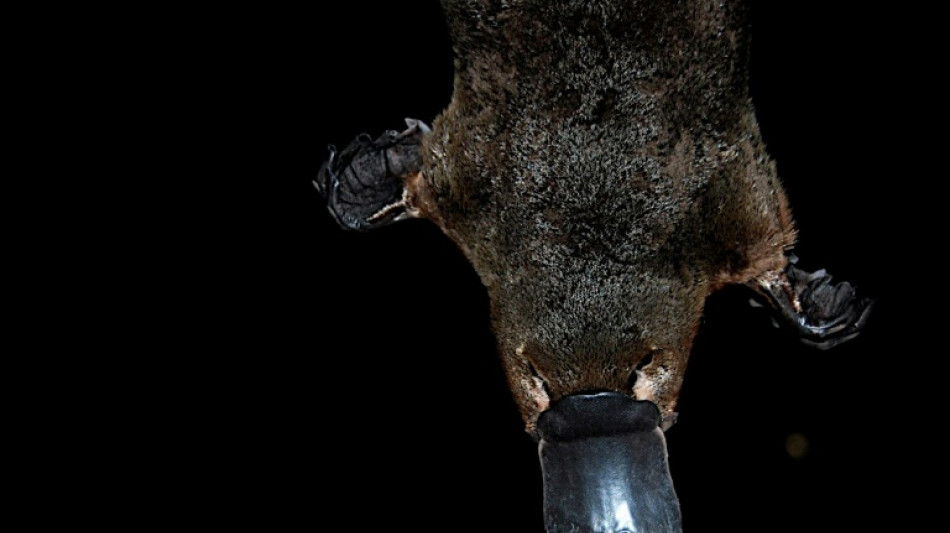
-
 Wall Street stocks steady after positive jobs data
Wall Street stocks steady after positive jobs data
-
Trump blasts Democrats as government shutdown becomes longest ever

-
 Indian pilgrims find 'warm welcome' in Pakistan despite tensions
Indian pilgrims find 'warm welcome' in Pakistan despite tensions
-
Inter and AC Milan complete purchase of San Siro

-
 Swedish authorities inspect worksite conditions at steel startup Stegra
Swedish authorities inspect worksite conditions at steel startup Stegra
-
Keys withdraws from WTA Finals with illness

-
 Prince Harry says proud to be British despite new life in US
Prince Harry says proud to be British despite new life in US
-
EU strikes last-ditch deal on climate targets as COP30 looms

-
 Stocks retreat as tech bubble fears grow
Stocks retreat as tech bubble fears grow
-
Shein opens first permanent store amid heavy police presence

-
 West Indies edge New Zealand despite Santner brilliance
West Indies edge New Zealand despite Santner brilliance
-
French pair released by Iran await return home

-
 German factory orders up but outlook still muted
German factory orders up but outlook still muted
-
Death toll tops 100 as Philippines digs out after typhoon

-
 Attack on key city in Sudan's Kordofan region kills 40: UN
Attack on key city in Sudan's Kordofan region kills 40: UN
-
'No one could stop it': Sudanese describe mass rapes while fleeing El-Fasher

-
 Champagne and cheers across New York as Mamdani soars to victory
Champagne and cheers across New York as Mamdani soars to victory
-
Medieval tower collapse adds to Italy's workplace toll

-
 BMW boosts profitability despite China, tariff woes
BMW boosts profitability despite China, tariff woes
-
South Africa's Wiese wary of 'hurt' France before re-match

-
 Beyond limits: Croatian freediver's breathtaking record
Beyond limits: Croatian freediver's breathtaking record
-
Tottenham supporting Udogie after alleged gun threat in London

-
 Thunder roll Clippers to stay unbeaten as SGA keeps streak alive
Thunder roll Clippers to stay unbeaten as SGA keeps streak alive
-
In appeal, Australian mushroom murderer alleges 'miscarriage of justice'

-
 Toyota hikes profit forecasts 'despite US tariffs'
Toyota hikes profit forecasts 'despite US tariffs'
-
Ex-France lock Willemse challenges Meafou to become 'the bully'

-
 Ukrainians to honour sporting dead by building country they 'died for': minister
Ukrainians to honour sporting dead by building country they 'died for': minister
-
At least 7 dead after UPS cargo plane crashes near Louisville airport

-
 US Supreme Court hears challenge to Trump tariff powers
US Supreme Court hears challenge to Trump tariff powers
-
US government shutdown becomes longest in history

-
 India's Modi readies bellwether poll in poorest state
India's Modi readies bellwether poll in poorest state
-
Green goals versus growth needs: India's climate scorecard

-
 Where things stand on China-US trade after Trump and Xi talk
Where things stand on China-US trade after Trump and Xi talk
-
Sri Lanka targets big fish in anti-corruption push

-
 NY elects leftist mayor on big election night for Democrats
NY elects leftist mayor on big election night for Democrats
-
Injured Jordie Barrett to miss rest of All Blacks tour

-
 Asian markets tumble as tech bubble fears grow
Asian markets tumble as tech bubble fears grow
-
Pay to protect: Brazil pitches new forest fund at COP30

-
 Iraq's social media mercenaries dying for Russia
Iraq's social media mercenaries dying for Russia
-
Young leftist Trump foe elected New York mayor

-
 Concerns at ILO over expected appointment of close Trump advisor
Concerns at ILO over expected appointment of close Trump advisor
-
Venus Williams to return to Auckland Classic at the age of 45

-
 No deal yet on EU climate targets as COP30 looms
No deal yet on EU climate targets as COP30 looms
-
Typhoon death toll climbs to 66 in the Philippines

-
 NATO tests war preparedness on eastern flank facing Russia
NATO tests war preparedness on eastern flank facing Russia
-
Uncapped opener Weatherald in Australia squad for first Ashes Test

-
 Liverpool down Real Madrid in Champions League, Bayern edge PSG
Liverpool down Real Madrid in Champions League, Bayern edge PSG
-
Van Dijk tells Liverpool to keep calm and follow Arsenal's lead

-
 PSG left to sweat on injuries to Dembele and Hakimi
PSG left to sweat on injuries to Dembele and Hakimi
-
Reddit, Kick to be included in Australia's social media ban


Australia's 'irreplaceable' platypus threatened by dams: study
The future of the platypus, a unique duck-billed, egg-laying mammal only found in Australia, is under threat because they cannot climb over tall river dams, according to a new study.
The platypus is an oddity in many ways. As well as its duck-like bill and egg-laying, it is a rare venomous mammal, brandishing centimetre-long poisonous spurs on its hind legs.
They are also one of the only mammals who can locate prey by detecting electric fields and whose fur glows blue-green under an ultraviolet light. Platypuses even have 10 sex chromosomes -- most mammals have two.
But the number of platypuses has fallen by 50 percent since Europeans settled Australia more than two centuries ago, according to previous research.
Its habitat has increasingly come under threat from climate change-fuelled extreme weather events including drought and fire. They are also preyed upon by invasive species such as foxes, cats and dogs.
A new study published in the journal Communications Biology this week identified a new threat: platypuses are not able to climb over large, human-madedams in rivers.
The study's lead author, Jose Luis Mijangos of the University of New South Wales, told AFP that "there might be as few as 30,000 mature platypuses" left in Australia.
More than three quarters of Australia's dams measuring over 10 metres (33 feet) are in regions where platypuses live, the study said.
Some platypuses, which mostly live in rivers and streams but can use their webbed feet to walk on land, have been reported to be able to cross smaller dams.
But they cannot get over taller dams, isolating the animals from each other, the study found.
- Increased inbreeding -
The researchers took the DNA samples of 274 platypuses from nine rivers in the states of Victoria and New South Wales. Five of the rivers have dams between 85 to 180 metres tall, while the others flow unimpeded.
Comparing the samples, they found that genetic differences were four to 20 times higher in platypus populations around the dammed rivers compared to those not living near dams, indicating the first group rarely mixed with others.
They also estimated that the genetic differences had increased in every platypus generation since the nearby dams had been completed.
"These results suggest that almost no or no platypuses have passed around the dams since they were built," Mijangos said.
As a result, "populations are fragmented, which means that the ability to recolonise available habitat or migrate to areas with more suitable conditions is restricted," he added.
"Fragmentation also simultaneously reduces both local population size and gene flow, each of which is expected to lead to increased inbreeding and reduction of the genetic variation."
To address the problem, the researchers propose structures be built to help the platypuses scale the dams. They also suggested that humans could relocate some platypuses to promote diversity.
After all, the platypus is too weird to be lost.
"Platypuses are arguably the most irreplaceable mammal because they have a unique combination of features," Mijangos said.
Y.Bouchard--BTB




